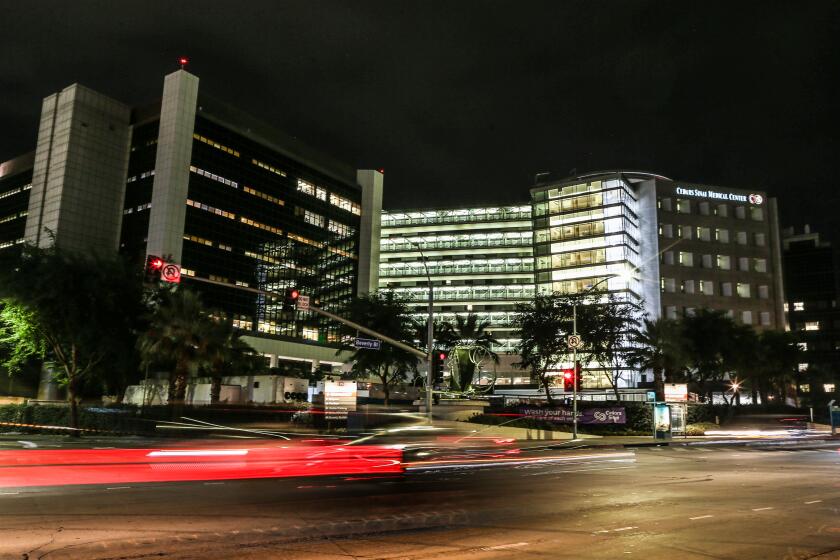1-Day Strike by UC Nurses Averted
A Superior Court judge in Sacramento barred 9,000 registered nurses at the University of California from holding a one-day strike today at UC hospitals and student health centers, heightening tensions between the nurses union and the Schwarzenegger administration.
The California Nurses Assn. called the strike this month because its negotiators were unable to reach agreement on a new contract with the UC system. But the state Public Employment Relations Board convinced Judge Loren E. McMaster on Wednesday that the strike would probably be illegal because negotiations had not reached an impasse.
The nurses union said its members would stage informational pickets and rallies today at UC medical centers -- including UCLA hospitals in Westwood and Santa Monica -- but they would obey the judge’s order to report to work.
Labor officials blamed Gov. Arnold Schwarzenegger for trying to undermine nurses’ pensions and to soften the state-mandated ratio of patients that each nurse is allowed to care for.
“Everything leads back to Schwarzenegger,” said Rose Ann DeMoro, the union’s executive director. “There’s an agenda in the state of California basically to reduce staffing ratios, to go after pensions and it’s all playing out here at the University of California....The nurses are furious.”
The UC system extended its final offer last month, the nurses rejected it, and the two sides have not met since. UC spokesman Noel Van Nyhuis characterized the system’s proposal as fair and said its hospitals put patient care first. The last contract expired April 30, but had been extended through July 8.
UC President Robert C. Dynes told reporters that he was “absolutely pleased” with the injunction. “I believe we should be working this out at the bargaining table,” he said at the beginning of the two-day regents’ meeting, held at UC San Francisco’s Laurel Heights campus.
Until the judge delayed the strike, UC hospitals were lining up temporary nurses and, in some cases, delaying elective surgeries.
UC Davis also stopped accepting transfers from other hospitals and had planned to shut down some of the intensive care units and to close its emergency department and trauma center to walk-in patients.
Now that the strike has been called off, officials said the medical center is working to get back to normal. “Even planning for the strike had a profound effect on us,” said Sharon Melberg, the Davis hospital’s assistant director of patient care services.
A hearing is scheduled next month for additional arguments on the nurses’ right to strike.
One of the main disputes between the UC system and the nurses union involves staffing ratios. A law, passed by the Legislature in 1999 and signed by then-Gov. Gray Davis, required one nurse for every six patients in general medical-surgical wards by Jan. 1, 2004, and one nurse for every five patients by Jan. 1, 2005.
Last November and again in March, Schwarzenegger issued an emergency order seeking to delay the 1-to-5 ratio until 2008, saying moving too quickly would exacerbate a nursing shortage. In June, a judge in Sacramento permanently blocked the order from taking effect, so the ratio is now 1-to-5.
State officials then issued an identical order July 1, prompting Judge Judy Holzer Hersher to set a hearing next month on whether Schwarzenegger and two of his appointees should be held in contempt of court for violating her previous order.
The nurses union wants UC to abide by the 1-to-5 ratio even if Schwarzenegger succeeds at changing the law. Van Nyhuis said the issue is not subject to bargaining. “Since we’re following state law in the first place, it seems like a moot point,” he said.
Union officials also say the UC system is trying to undermine the nurses’ pension plan and won’t agree to proposals for the safe handling of overweight patients to reduce back injuries. Van Nyhuis said the claims were false.
Emmanuel Punzalan, an oncology nurse at UCLA Medical Center and a member of the union bargaining team, said the strike delay had not dampened morale among nurses at UCLA. “It has caused them to get further agitated and more outraged by the UC’s attempt to block our democratic right to strike,” Punzalan said.
UC Regent Sherry Lansing, who heads the regents health services committee, said the university is not acting at the behest of the governor, who also is a regent. “It’s a separate thing,” said Lansing, the former head of Paramount Pictures. “What we really care about is good patient care, and we know the nurses are invaluable to that.”
Republican political analyst Allan Hoffenblum said a strike would have only frustrated patients and eroded some of the support nurses have garnered. Right now, he said, nurses have the upper hand in their dispute with the governor over staffing and pension policies.
Times staff writer Rebecca Trounson in San Francisco contributed to this report.
More to Read
Sign up for Essential California
The most important California stories and recommendations in your inbox every morning.
You may occasionally receive promotional content from the Los Angeles Times.










